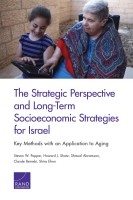| 来源类型 | Research Reports
|
| 规范类型 | 报告
|
| ISBN | 9780833090737
|
| 来源ID | RR-488-IPMO
|
| The Strategic Perspective and Long-Term Socioeconomic Strategies for Israel: Key Methods with an Application to Aging |
| Steven W. Popper; Howard J. Shatz; Shmuel Abramzon; Claude Berrebi; Shira Efron
|
| 发表日期 | 2015
|
| 出版年 | 2015
|
| 页码 | 186
|
| 语种 | 英语
|
| 结论 |
The Iterative Process of a Strategic Perspective Can Help Israel Shape Policy- Israel will profit from bringing a systemic strategic perspective into its policy process. Formal strategic planning places emphasis on an output, while a strategic perspective is a process for bringing an analytical element into policy decisionmaking.
- Decision and action should be informed by observation and orientation. The circularity of this process suggests the value of having these functions be integral to the institutions involved in decisionmaking.
- Despite the difficulties, it is possible to make explicit the objectives for socioeconomic policy and use this as a framework for a strategic perspective.
- A strategic perspective can be obtained by going through a series of steps outlined in the report that not only build on each other but also allow later steps to shed greater light on those that have preceded them.
- Population aging presents a good example of an "inevitable surprise" for which Israel should now begin to plan and frame government policy.
|
| 摘要 |
- Israel's government should engage in and support processes for encouraging comprehensive thinking, defining what might be acceptable ranges of values for indicators of socioeconomic well-being, horizon-scanning and early warning, and defining and constructing forecasts or framing scenarios designed to inform policy discussions.
- Achieving this enhanced capacity requires creating a system for an early detection of trends and opportunities; creating government-wide capabilities to weigh potential alternative policies and their likely consequences in advance, which will increase the chances for policy success and reduce the unintended consequences of policy choices; providing the foundation for wider discussions within the government of complex issues that are difficult to conduct on a shorter-term, crisis basis; and establishing processes that assess, on an ongoing basis, strengths, weaknesses, opportunities, and threats and feed these assessments back into strategic thinking.
- Such an approach will not eliminate inevitable policy controversies that arise in a heterogeneous society, such as Israel's. But it will permit greater focus on the issues Israel confronts by creating a more widely shared basis for formulating and discussing alternative actions. This not only could provide more foundation for concerted public action but will allow the government to engage with the people of Israel in a manner that provides more opportunity for sharing insight and concerns and mobilizing consensus.
- The authors recommend employing versions of the techniques outlined in this report for achieving these goals.
|
| 主题 | The Elderly
; Gerontology
; Israel
; Politics and Government
; Socioeconomic Status
|
| URL | https://www.rand.org/pubs/research_reports/RR488.html
|
| 来源智库 | RAND Corporation (United States)
|
| 资源类型 | 智库出版物
|
| 条目标识符 | http://119.78.100.153/handle/2XGU8XDN/108118
|
推荐引用方式
GB/T 7714 |
Steven W. Popper,Howard J. Shatz,Shmuel Abramzon,et al. The Strategic Perspective and Long-Term Socioeconomic Strategies for Israel: Key Methods with an Application to Aging. 2015.
|
|
文件名:
|
x1495316371151.jpg
|
|
格式:
|
JPEG
|

|
文件名:
|
RAND_RR488.pdf
|
|
格式:
|
Adobe PDF
|
除非特别说明,本系统中所有内容都受版权保护,并保留所有权利。